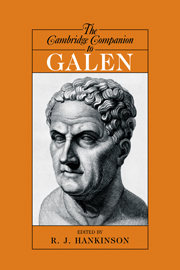Book contents
- Frontmatter
- 1 The man and his work
- 2 Galen and his contemporaries
- 3 Methodology
- 4 Logic
- 5 Language
- 6 Epistemology
- 7 Psychology
- 8 Philosophy of nature
- 9 Anatomy
- 10 Physiology
- 11 Therapeutics
- 12 Drugs and pharmacology
- 13 Commentary
- 14 The fortunes of Galen
- Appendix 1: A guide to the editions and abbreviations of the Galenic corpus
- Appendix 2: English titles and modern translations
- Bibliography
- Index
14 - The fortunes of Galen
Published online by Cambridge University Press: 28 September 2008
- Frontmatter
- 1 The man and his work
- 2 Galen and his contemporaries
- 3 Methodology
- 4 Logic
- 5 Language
- 6 Epistemology
- 7 Psychology
- 8 Philosophy of nature
- 9 Anatomy
- 10 Physiology
- 11 Therapeutics
- 12 Drugs and pharmacology
- 13 Commentary
- 14 The fortunes of Galen
- Appendix 1: A guide to the editions and abbreviations of the Galenic corpus
- Appendix 2: English titles and modern translations
- Bibliography
- Index
Summary
To describe the fortunes of Galen over the centuries is almost to write the history of medicine since his death. Not only did his ideas constitute the basis of formal medicine in Europe at least until the seventeenth century, and arguably until the nineteenth, but as Yunani medicine (i.e. Greek medicine as consolidated and developed by Ibn Sina [Avicenna], d. 1037), they constitute a major medical tradition in the modern Muslim world. Galen's holistic approach can also be found among modern practitioners of complementary medicine, as well as in one branch of Tibetan medicine. Galen's conception of Hippocrates and Hippocratic medicine not only dominated until recently historians' approaches to their medical past but, more subtly, continues to influence modern perceptions of what medicine is and how it should be practised. Galen's ideal of the learned, thinking practitioner still directs our preconceptions of what a doctor should be like, even if his demands for constant training in philosophy and in dissection can be fulfilled only with difficulty. Historians' knowledge of Galen continues to increase, not only because his writings have been studied more closely in the last thirty years than at any time since the seventeenth century, but also because there has been a steady accession of new discoveries, albeit principally in medieval translations rather than in his original Greek. Indeed, modern scholars are more familiar with Galen's works than were their predecessors in Byzantium and all but a handful of experts in the Islamic world.
- Type
- Chapter
- Information
- The Cambridge Companion to Galen , pp. 355 - 390Publisher: Cambridge University PressPrint publication year: 2008
- 17
- Cited by

